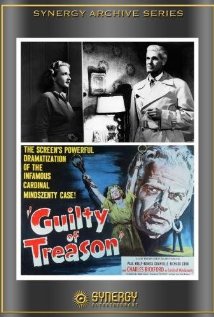
GUILTY OF TREASON
US, 1950, 90 minutes, Black-and-white.
Charles Bickford, Paul Kelly, Bonita Granville, Elizabeth Risdon.
Directed by Felix E. Feist.
Guilty of Treason is a film of its time, 1950, the early years of the Iron Curtain, the growing hostility between the Soviet Union and the United States, the years prior to the death of Stalin. This period was noted for its hostility to the Catholic Church and the arrest of several of the ecclesiastical leaders, including Cardinal Joseph Minzenty of Hungary.
Many of the films of the time served as propaganda pieces against Communism, are relevant to the blacklisting in Hollywood, the hearings by Senator Joseph Mc Carthy as well as the contemporary House of Un American Activities hearings.
Paul Kelly plays a journalist, formerly based in Moscow and questioning authorities there, visiting Budapest and investigating the situation of Cardinal Mindzenty. He comes across a young woman, a teacher, played by Bonita Granville, who is in love with a Soviet official, Richard Derr.
The Cardinal is played by Charles Bickford with a blend of dignity, Church loyalty as well as farming and peasant background. There is a scene where he is visited on his farm by the journalist and the teacher, an opportunity for him to tell his story, meet his peasant mother, work on a farm, his love for being a parish priest, his taking his responsibilities as Primate of the church in Hungary very seriously.
When he is arrested, he is interrogated, especially about loyalties to the state, questions from Hungarian officials as well as an observer from Moscow. There are scenes of his being tortured, stood in the spotlight to answer questions, the physical and psychological conditioning – but he had written a document earlier warning people to be careful about what he said under the pressure of torture. He is accused in the court, found guilty, imprisoned. For dramatic purposes, the teacher is also arrested and seriously interrogated and tortured, probably finishing in the Gulags.
Comparisons can be made with the 1955 film by Peter Glenville, The Prisoner, a dramatic account by playwright Bridget Boland on the plight of Cardinal Minzenty, but filmed as a piece of contemporary fiction.
With the Hungarian uprising in 1956, the Cardinal was able to take refuge in the American embassy where he stayed for a decade before detente between eastern Europe and the Vatican enabled him in the 1960s to go to Rome.
1. A film of 1950? Propaganda? Anti-Communist? Supportive of the Catholic Church, of Cardinal Mindzenty?
2. The aftermath of World War II, alliance with Russia during the war, the coming down of the Iron Curtain, the closure of Eastern Europe, the different countries becoming satellites of Russia?
3. The Stalinist regimes, one state, complete loyalty, secret police, prison for dissent, torture, the gulags?
4. The American attitude, the big lift in Berlin, themes of freedom, the work of the journalists, diplomacy? The exposé in articles and books?
5. The framework? For the Mindzenty story? Tom Kelly, in Moscow, in Budapest, his book, his lecture, exhortations?
6. The context for the Mindzenty story? The attack on the Catholic Church, and especially Catholics schools?
7. The visit by Kevin and Stevie, the Cardinal, at the farm, his peasant background, German name, changing his name to that of the village he came from? his mother, remembering his time as parish priest, his role as Cardinal? His decisions, preparation for the arrest, his document warning about confessions and torture? In prison, the spotlight on him and his interrogation? Considered subversive, questions about loyalty to the state? The torture? The effect of torture? His stances on charity, justice and freedom? Love for his country, love for the church, the scenes in court, his mother’s presence? His prison sentence?
8. Tom, the encounter with Stevie, her story, not Catholic, love for Alex, her work in the school, the challenge to understand liberty, organising visit to the cardinal? The scenes with Alex, the love, the risk, the torture, imprisonment?
9. Tom, with Alex, with Stevie? His being bashed, saved?
10. Alex, loyalty, love for Stevie, his conscience, her arrest, his career?
11. The presentation of the Russian official, diplomacy, his presence in the interrogations? The local Polish officials and the pressure?
12. The film in the light of the history of the cardinal in the American Embassy, going to Rome? The Hungarian uprising in 1956?